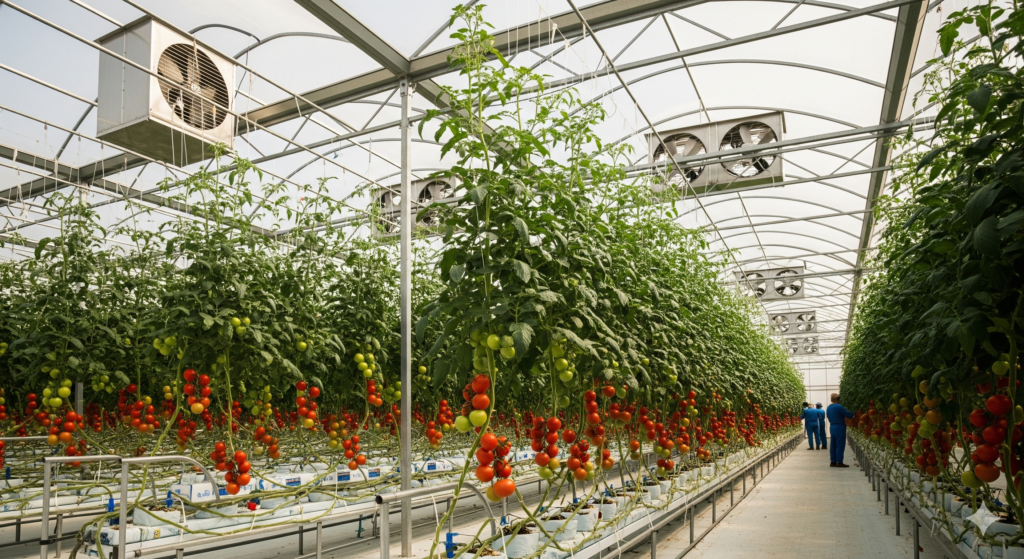How a Tomato Farm Increased Yield by 65% Using a Polyhouse by AgroDome
Introduction
Tomatoes are one of the most widely grown and consumed vegetables in India, but open-field tomato farming comes with its fair share of challenges. Fluctuating weather patterns, pest infestations, and market volatility often reduce profitability for farmers. Protected cultivation, especially through polyhouses, has emerged as a game-changer in bridging this gap. This case study highlights how AgroDome Projects LLP partnered with a progressive farmer in Maharashtra to design and install a polyhouse that boosted tomato yields by 65%, improved quality, and ensured year-round production.
The Challenge
The farmer, Mr. Ramesh Patil, cultivated tomatoes on three acres in open fields near Nashik. While the soil was fertile and water availability was adequate, his yields fluctuated drastically between seasons. During the hot summers, high temperatures caused flower drop and poor fruit setting. The monsoons brought heavy rainfall that not only damaged plants but also created conditions for fungal diseases like blight. Winter frosts occasionally led to crop losses.
On average, his tomato yield was around 45–50 tons per acre per year, but nearly 30% of the produce was either undersized or damaged, fetching lower market prices. Additionally, pesticide and fungicide costs kept rising, eating into profits. Ramesh knew he needed a solution that would stabilize yields and ensure better returns.
The AgroDome Solution
After consulting with AgroDome experts, Ramesh decided to install a polyhouse covering one acre, with provisions for drip irrigation, fertigation, and natural ventilation. AgroDome’s technical team designed a structure customized for the local climate, with the following features:
- UV-stabilized polyfilm covering with high light transmission and diffusion to ensure uniform growth.
- Side ventilation panels with insect-proof nets to regulate temperature and minimize pest entry.
- Drip irrigation and fertigation system for precise water and nutrient delivery.
- Raised beds with mulching film to reduce weed growth and conserve moisture.
- Fogging and cooling provision for peak summer months.
The structure was designed to withstand local wind and rain conditions, ensuring durability. AgroDome also provided training to Ramesh and his farmworkers on managing a polyhouse, including crop scheduling, pruning, pollination techniques, and integrated pest management.
Results: A 65% Increase in Yield
The results were visible within the very first crop cycle. Compared to open-field cultivation, the polyhouse-grown tomatoes showed significant improvement in both quantity and quality.
- Yield Increase: Average production inside the polyhouse reached 82 tons per acre per year, compared to 50 tons in open field. This represented a 65% increase in yield.
- Quality Improvement: More than 90% of the harvested tomatoes were uniform in size, color, and firmness, meeting premium market standards.
- Reduced Losses: Pest infestation was reduced by nearly 70%, while fungal disease incidence dropped drastically due to controlled humidity and reduced leaf wetness.
- Lower Input Costs: Precise fertigation reduced fertilizer usage by 25%, while pesticide usage dropped by almost 40%.
- Year-Round Production: The polyhouse environment allowed for staggered planting and harvesting schedules, ensuring continuous supply even during off-seasons when market prices were higher.
Ramesh was able to sell his tomatoes at an average of 20–25% higher prices compared to open-field produce because of the superior quality and off-season availability.
Farmer’s Perspective
Ramesh shared his experience:
“I was initially hesitant about investing in a polyhouse, but AgroDome’s team guided me at every step. The difference is incredible—inside the polyhouse, plants are healthier, fruits are bigger, and I don’t have to worry about sudden rains or scorching heat destroying my crop. My profits have almost doubled within just two crop cycles. I am now planning to expand to two more polyhouses.”
Broader Impact
This project highlights not only the direct benefits to one farmer but also the larger implications for India’s agricultural sector:
- Food Security: Stable yields of tomatoes help meet the growing demand in urban markets.
- Farmer Income: Protected cultivation significantly enhances profitability and reduces risk.
- Sustainability: Efficient use of water and fertilizers makes polyhouses more environmentally friendly than traditional open-field methods.
- Scalability: With government subsidies available for polyhouse construction in many states, more farmers can replicate this success.
Lessons Learned
- Customization is Key: A polyhouse must be designed to suit local climate and crop requirements.
- Training Makes the Difference: Farmers need hands-on guidance to adapt to polyhouse cultivation techniques.
- Market Linkages Matter: Higher-quality produce fetches premium prices only if connected to reliable buyers. AgroDome assisted Ramesh in finding wholesale buyers who valued off-season supply.
- ROI Timeline: While the initial investment was substantial, Ramesh recovered nearly 60% of his investment within two years, proving the financial viability of the project.
Conclusion
This case study of Ramesh Patil’s tomato farm illustrates how AgroDome’s polyhouse solutions can transform traditional farming practices into profitable, sustainable enterprises. By providing the right infrastructure, technical expertise, and after-sales support, AgroDome helped increase tomato yield by 65%, improve quality, and reduce input costs.
Protected cultivation is not just about growing crops under cover; it is about empowering farmers to take control of their environment, reduce risks, and secure their livelihoods. For many like Ramesh, a polyhouse is not just an agricultural structure—it is a pathway to resilience, profitability, and a brighter future in farming.

